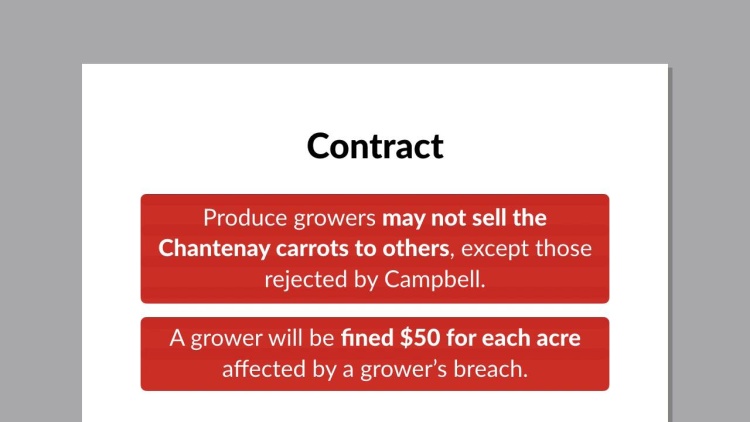Campbell Soup Co. v. Wentz
United States Court of Appeals for the Third Circuit
172 F.2d 80 (1948)
- Written by Jamie Milne, JD
Facts
Campbell Soup Company (Campbell) (plaintiff) contracted with George B. Wentz and Harry T. Wentz (the Wentzes) (defendants) to purchase all of the Chantenay red-cored carrots the Wentzes grew on 15 acres during the 1947 growing season. The contract was a preprinted contract drafted by Campbell; it provided, among other things, strict conformity guidelines for the carrots, determinable at Campbell’s discretion, as well as liquidated damages in the event of a grower’s breach. Further, the agreement provided that if Campbell was excused from buying the carrots, the grower could not sell the carrots elsewhere in the market without Campbell’s approval. In the agreement, Campbell agreed to purchase the carrots from the Wentzes at prices ranging from $23 to $30 per ton. Campbell used Chantenay carrots in most of its soups because of the carrots’ unique color and texture. Doing so allowed Campbell to maintain a uniform appearance in its soups. Campbell furnished the seeds for Chantenay carrots to its growers. During the 1947 season, Chantenay carrots became extremely difficult to obtain, and market prices climbed dramatically to over $90 a ton. At the end of the growing season, the Wentzes refused to deliver the carrots to Campbell at the contract price. In an attempt to get around the contract’s restrictions, the Wentzes sold the carrots to a neighboring farmer (defendant), who resold the carrots on the open market. Half of the carrots sold by the neighboring farmer were purchased by Campbell. Campbell stopped purchasing the carrots because it suspected it was purchasing the same carrots it had contracted to purchase from the Wentzes. Campbell filed suit against the Wentzes and the neighboring farmer, seeking an injunction prohibiting the sale of the contracted-for carrots to others and an order requiring specific performance of the contract by the Wentzes. The district court found that the carrots were not unique goods and that equitable relief was therefore inappropriate. Campbell appealed.
Rule of Law
Issue
Holding and Reasoning (Goodrich, J.)
What to do next…
Here's why 910,000 law students have relied on our case briefs:
- Written by law professors and practitioners, not other law students. 47,100 briefs, keyed to 997 casebooks. Top-notch customer support.
- The right amount of information, includes the facts, issues, rule of law, holding and reasoning, and any concurrences and dissents.
- Access in your classes, works on your mobile and tablet. Massive library of related video lessons and high quality multiple-choice questions.
- Easy to use, uniform format for every case brief. Written in plain English, not in legalese. Our briefs summarize and simplify; they don’t just repeat the court’s language.





